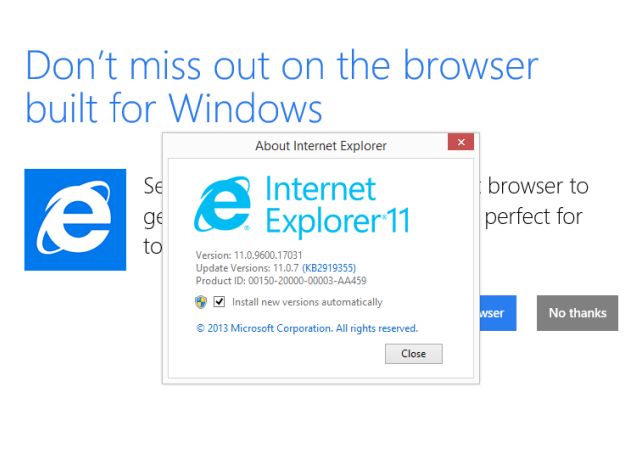Microsoft to Stop Support for Older Versions of Internet Explorer in 2016

This might come as bad news for users who have resisted change and refused to upgrade from older versions of the Internet Explorer (IE) browser. From January 12, 2016, Microsoft will stop support for older versions of Internet Explorer. Via the MSDN blog, the tech giant announced its intention to push more users to run a modern browser (of course, Microsoft means the latest version of Internet Explorer).
In the same blog Microsoft outlines the combinations of operating systems and browser version combinations that won't be supported from that day: Windows Vista SP2 and Internet Explorer 9, Windows Server 2008 SP2 and Internet Explorer 9, Windows 7 SP1 and Internet Explorer 11, Windows Server 2008 R2 SP1and Internet Explorer 11, Windows 8.1 and Internet Explorer 11, Windows Server 2012 and Internet Explorer 10, and Windows Server 2012 R2 and Internet Explorer 11.
Microsoft further states, "After January 12, 2016, only the most recent version of Internet Explorer available for a supported operating system will receive technical support and security updates. For example, customers using Internet Explorer 8, Internet Explorer 9, or Internet Explorer 10 on Windows 7 SP1 should migrate to Internet Explorer 11 to continue receiving security updates and technical support."
ZDNet interestingly notes that while Microsoft will drop support for the five-year-old IE 8 completely on that date, a Net Applications survey shows that IE 8 is still the single-most popular browser version worldwide, and installed on 21.56 percent of all PCs running Windows OS.
This decision will affect businesses still stuck to older versions of IE who might have to get a move on from their affinity for legacy software.
Get your daily dose of tech news, reviews, and insights, in under 80 characters on Gadgets 360 Turbo. Connect with fellow tech lovers on our Forum. Follow us on X, Facebook, WhatsApp, Threads and Google News for instant updates. Catch all the action on our YouTube channel.
Related Stories
- Samsung Galaxy Unpacked 2026
- iPhone 17 Pro Max
- ChatGPT
- iOS 26
- Laptop Under 50000
- Smartwatch Under 10000
- Apple Vision Pro
- Oneplus 12
- OnePlus Nord CE 3 Lite 5G
- iPhone 13
- Xiaomi 14 Pro
- Oppo Find N3
- Tecno Spark Go (2023)
- Realme V30
- Best Phones Under 25000
- Samsung Galaxy S24 Series
- Cryptocurrency
- iQoo 12
- Samsung Galaxy S24 Ultra
- Giottus
- Samsung Galaxy Z Flip 5
- Apple 'Scary Fast'
- Housefull 5
- GoPro Hero 12 Black Review
- Invincible Season 2
- JioGlass
- HD Ready TV
- Latest Mobile Phones
- Compare Phones
- Tecno Pova Curve 2 5G
- Lava Yuva Star 3
- Honor X6d
- OPPO K14x 5G
- Samsung Galaxy F70e 5G
- iQOO 15 Ultra
- OPPO A6v 5G
- OPPO A6i+ 5G
- Asus Vivobook 16 (M1605NAQ)
- Asus Vivobook 15 (2026)
- Brave Ark 2-in-1
- Black Shark Gaming Tablet
- boAt Chrome Iris
- HMD Watch P1
- Haier H5E Series
- Acerpure Nitro Z Series 100-inch QLED TV
- Asus ROG Ally
- Nintendo Switch Lite
- Haier 1.6 Ton 5 Star Inverter Split AC (HSU19G-MZAID5BN-INV)
- Haier 1.6 Ton 5 Star Inverter Split AC (HSU19G-MZAIM5BN-INV)
-
 iPhone 18 Series to Drop SIM Card Slot in Europe to Make Room for Slightly Larger Battery: Report
iPhone 18 Series to Drop SIM Card Slot in Europe to Make Room for Slightly Larger Battery: Report
-
 Poco X8 Pro Spotted on Geekbench With MediaTek Dimensity 8500 Ultra SoC, Android 16
Poco X8 Pro Spotted on Geekbench With MediaTek Dimensity 8500 Ultra SoC, Android 16
-
 Xiaomi 17, Xiaomi 17 Ultra Global Price Details, Launch Date and Colour Options Leaked
Xiaomi 17, Xiaomi 17 Ultra Global Price Details, Launch Date and Colour Options Leaked
-
 X Building Smart 'Cashtags' to Let Users Check Cryptocurrency Prices in Real-Time
X Building Smart 'Cashtags' to Let Users Check Cryptocurrency Prices in Real-Time




![[Partner Content] OPPO Reno15 Series: AI Portrait Camera, Popout and First Compact Reno](https://www.gadgets360.com/static/mobile/images/spacer.png)





